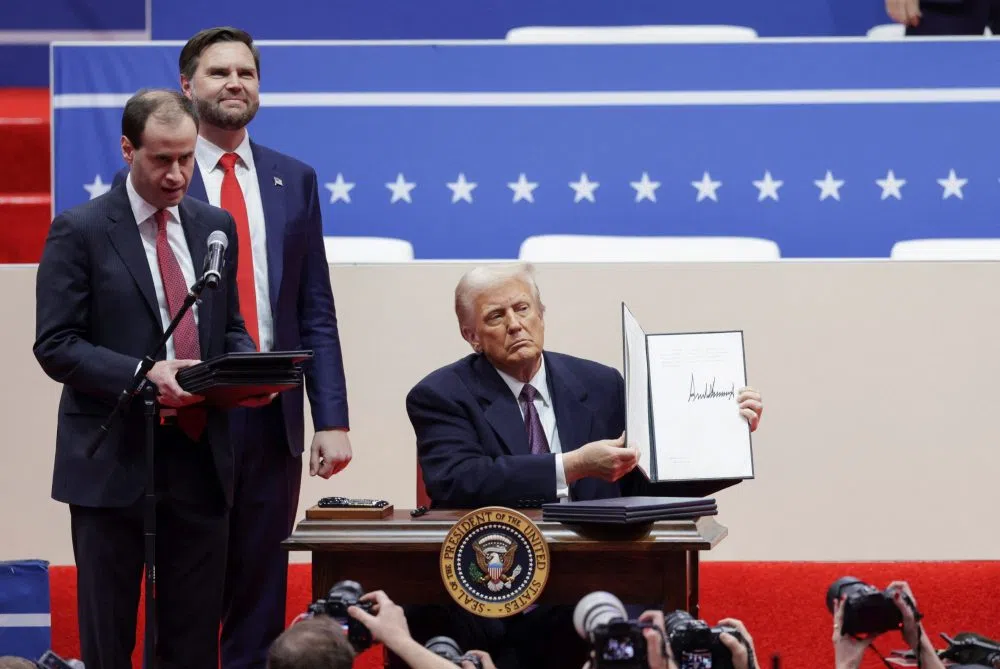WASHINGTON (Reuters) -Donald Trump moved swiftly to impose his will on the U.S. government as he reclaimed the presidency on Monday, taking steps to curb immigration, slash environmental regulations and withdraw from an international climate treaty.
Cheered by a crowd at an indoor rally, Trump sat at a desk as he signed a series of executive orders in leather dossiers, the first steps in enacting a far-reaching agenda to expand America’s territory, curb immigration, boost fossil fuel production and roll back environmental regulations.
He said he would sign more such orders when he reached the White House.
Earlier in the day, Trump, 78, took the oath of office in the Capitol Rotunda, the symbol of U.S. democracy that was invaded on Jan. 6, 2021, by a mob of Trump supporters intent on reversing Trump’s 2020 loss to Joe Biden.
Trump was expected to pardon hundreds of those supporters who have been imprisoned for their actions.
Trump portrayed himself as a savior chosen by God to rescue a faltering nation. His inauguration amounts to a triumphant return for a political disruptor who survived two assassination attempts and won election despite a criminal conviction and a prosecution stemming from his efforts to overturn his 2020 election loss.
“I was saved by God to make America great again,” he said.
Trump is the first president in more than a century to win a second term after losing the White House and the first felon to occupy the White House. The oldest president ever to be sworn in, he is backed by Republican majorities in both chambers of Congress.
He faces an arduous task delivering on his stated promise of a “Golden Age of America” in the face of a closely split Congress, inevitable lawsuits and recalcitrant world leaders.
But Trump’s aides quickly got to work.
Shortly after the inauguration, U.S. border authorities shut down a program that allowed hundreds of thousands of migrants to enter the U.S. legally by scheduling an appointment through a smartphone. Existing appointments were canceled. In the State Department, more than a dozen nonpartisan senior diplomats were asked to resign as part of a broader plan to replace nonpartisan civil servants with loyalists.
Trump’s initial executive orders revoked Biden administration policies governing artificial intelligence and electric vehicles, among others. He also imposed a freeze on federal hiring and ordered government workers to return to the office, rather than working from home.
He did not take immediate action on the economy or inflation, two issues that helped him win reelection. An official said he would not immediately impose new tariffs on Canada, China and Mexico as he had pledged to do, an unexpected development that unleashed a broad slide in the U.S. dollar and a rally in global stock markets on a day when U.S. financial markets were closed.
In his inaugural speech, Trump said he would declare a national emergency at the southern border with Mexico, dispatch troops there and resume a policy forcing asylum-seeking migrants to wait in Mexico for their U.S. court hearings – all a prelude to what he described as an unprecedented operation to deport millions of immigrants. Republican colleagues applauded and Democrats sat stone-faced.
He also said he would issue orders to scrap federal diversity programs and require the government to recognize only genders assigned at birth.
While Trump sought to portray himself as a peacemaker and unifier during his half-hour speech, his tone was often sharply partisan. He repeated false claims from his campaign that other countries were emptying their prisons into America and voiced familiar grievances over his criminal prosecutions.
With Biden seated nearby, Trump issued a stinging indictment of his predecessor’s policies from immigration to foreign affairs.
“We have a government that has given unlimited funding to the defense of foreign borders, but refuses to defend American borders, or more importantly, its own people,” Trump said.
Numerous tech executives who have sought to curry favor with the incoming administration – including the three richest men in the world, Tesla and SpaceX CEO Elon Musk, Amazon founder Jeff Bezos and Meta CEO Mark Zuckerberg – had prominent seats on stage, next to cabinet nominees and members of Trump’s family.
Trump said he would send astronauts to Mars, prompting Musk – who has long talked about colonizing the planet – to raise his fists.
Trump vowed to change the name of the Gulf of Mexico to the Gulf of America and repeated his intention to take back control of the Panama Canal, one of several foreign policy pronouncements that have caused consternation among U.S. allies.
RETURN TO POWER
Trump took the oath of office to “preserve, protect and defend” the U.S. Constitution at 12:01 p.m. ET (1701 GMT), administered by Chief Justice John Roberts. His vice president, JD Vance, was sworn in just before him.
Outgoing Vice President Kamala Harris, who lost to Trump in November, was seated next to Biden in a section with former Presidents Barack Obama, George W. Bush and Bill Clinton. Former Secretary of State Hillary Clinton, who lost to Trump in 2016, sat with her husband Bill. Obama’s wife, Michelle, chose not to attend.
The ceremony was moved indoors due to the extreme cold gripping much of the country.
Trump skipped Biden’s inauguration and has continued to claim falsely that the 2020 election he lost to Biden was rigged.
Biden, in one of his last official acts, pardoned several people whom Trump has threatened with retaliation, including General Mark Milley, a former chairman of the Joint Chiefs of Staff who Trump has suggested should be executed for holding back-channel talks with China. Milley’s portrait was removed from the Pentagon shortly after Trump’s inauguration.
He also pardoned five family members minutes before leaving office, citing fears that Trump would target them.
Police separated a group of 40 Proud Boys, a militant far-right group that backs Trump, from a dozen counter-protesters in downtown Washington, D.C.
“Whose streets? Our streets,” the Proud Boys chanted. Each side shouted expletives at the other.
(Reporting by Joseph Ax and Nandita Bose in Washington; Additional reporting by Bo Erickson, Steve Holland, Jeff Mason, Nandita Bose, Doina Chiacu, Stephanie Kelly, Rami Ayyub and Gram Slattery; Editing by Ross Colvin and Howard Goller)







Comments